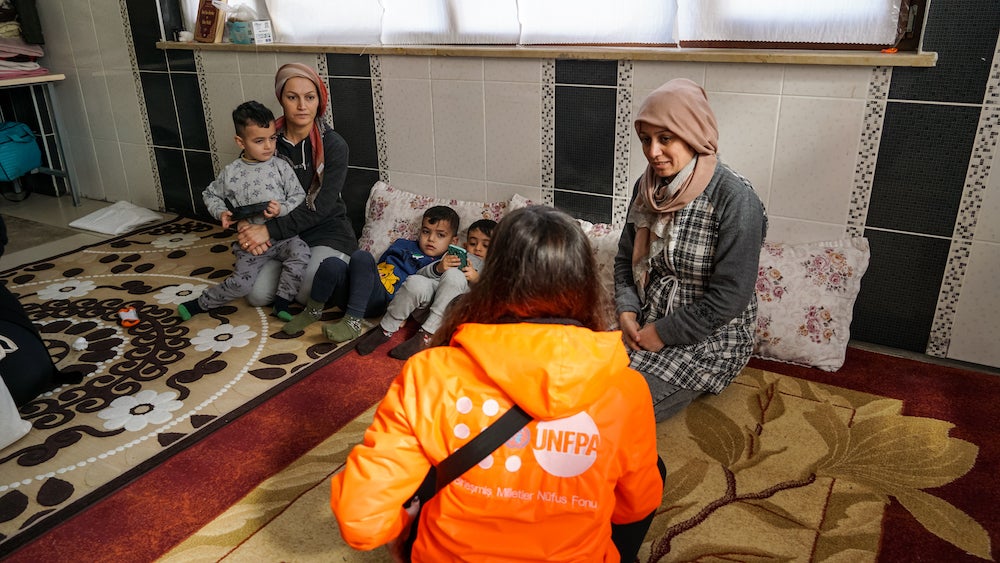“We were too scared. We left our houses immediately and couldn’t take anything for the birth, not a single baby cloth. There was no one to communicate with and no place to stay. We felt helpless.”
Buseyna fled her home in Adıyaman, one of the cities worst hit by the devastating earthquakes that struck Turkiye and Syria. The nearest hospitals were overwhelmed with casualties, so Busenya travelled over 50 miles with her mother to Şanlıurfa. There, she sought help from a UNFPA women and girls’ safe space. She gave birth to a baby girl, Meha, at the safe space. “You reached us, helped with the birth and gave me a bag with everything we needed,” she told UNFPA.
Early in the morning of 6 February, while most people were still sleeping, a powerful earthquake rocked Turkiye, carving death and destruction in the country’s southeast and in neighbouring Syria. Hours later, with people still trapped under the rubble, a second quake struck. More people lost their lives, saw their homes flattened, and hospitals and schools destroyed. Survivors saw their family, friends, and neighbors trapped under the rubble in perilous, freezing conditions.
Among the estimated 15 million people affected in Turkiye are over 214,000 pregnant women. 24,000 of these women are due to give birth in the next month. The quakes have exposed women, girls, newborns, and other vulnerable groups to severe risks of illness and violence. Among the most impacted are refugees from the war in Syria who were living .

Prioritizing health, protection for women and girls
In one of the worst-hit areas in Syria, Om Mohamed looked on at the splintered remnants of her neighbourhood. “I woke up to realize that I lost everything in one minute – no home, no clothes, no money, nothing at all. I’m speechless, I have lost any hope to live anymore.”
In Aleppo, the situation was just as desperate. “My home was my shelter and safe space for me and my kids, but now I am so afraid to go back there – it might collapse at any moment,” said Mohannad. She has since found refuge in the streets.
UNFPA safe spaces in Syria are providing violence prevention and response services to women and girls. Violence against women and girls spikes during crises, especially when women and girls don’t have access to secure living areas. We’ve provided hospitals, health centers, and safe spaces in Syria with dignity kits and mama kits. The kits include soap, a baby blanket, diapers, and postpartum pads to cover the essential needs of new moms and their newborns.
Thousands of pregnant women in Syria need urgent access to maternal health care, including emergency obstetric care and caesarean sections. With health centers undersupplied, damaged, or no longer standing, these operations could be life-threatening.
UNFPA is distributing thousands of blankets and packages of warm clothes. And, we are operating more than 20 mobile teams in the hardest hit areas. The teams include a gynecologist, a midwife, and a mental health counselor and provide critical servies to women and girls wherever they’re needed most.
Two trucks loaded with hundreds of reproductive health kits are going to northwest Syria. This effort is part of the first cross-border humanitarian aid to reach an area that was already in the grips of a protracted crisis before the earthquakes struck.
Pregnancy and childbirth don’t stop in a crisis
For 22-year-old Hatice*, also from Şanlıurfa, the fear and shock of the quake caused her to go into early labour. She reached a health facility in time to give birth safely, but quickly realized she didn’t have any supplies for her newborn. The earthquake had trapped all her belongings under the debris of her former home. After receiving a UNFPA mama kit and postpartum counselling, she said, “I am still scared to go out of the hospital, but at least my baby is safe.”
As of 10 February, an estimated 20,000 people have died in the crisis, with untold numbers injured. The numbers will likely rise as rescue teams clear the wreckage.
Sitting exhausted in the freezing temperatures of Aleppo, Ameera said, “It is extremely cold, we need blankets, mattresses and winter clothes: We are sleeping in public parks after our home collapsed.”
With essential medical supplies wiped out across the two countries and hundreds of health centers, maternity wards, and safe spaces damaged, health care providers are struggling to manage even life-threatening conditions. UNFPA is on the ground in Turkiye and Syria and we remain dedicated to reestablishing critcal services. The well-being and protection of millions of vulnerable, traumatized women and girls are at risk if we don’t. Donate today to support women and girls in Syria, Turkey, and wherever care is needed most.
*Name changed for privacy and protection.